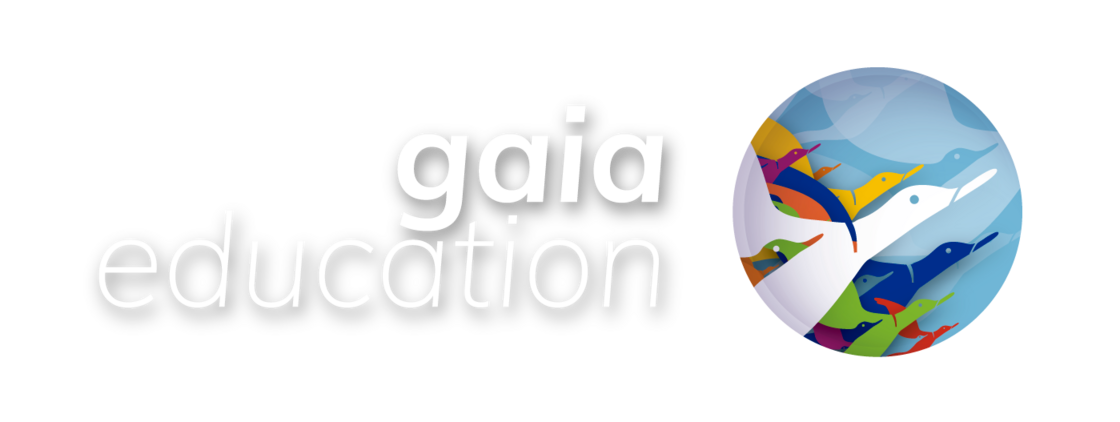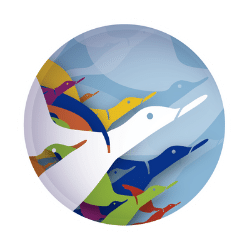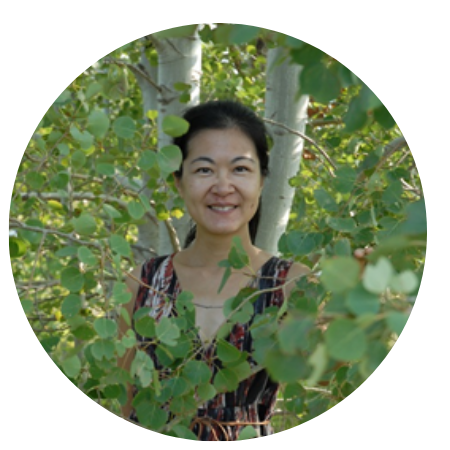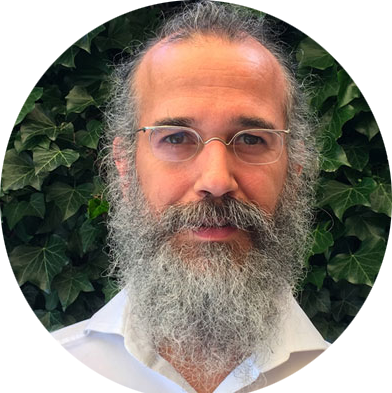Full Programme | Social | Economic | Ecological | Worldview
Worldview
Programme Overview
Type: e-Learning
Start Date: 2025
Study Time: 10 hours/ week
Facilitation: With Facilitators
Level: Intermediate
Registrations: until 2025
Developed by:
Explore many different perspectives and learn to build up a richer, more holistic worldview
We are truly living in a very unique time in the history of our civilization, facing several simultaneous challenges and converging crises: a deteriorating environment, a very unequal distribution of dwindling resources, widespread poverty, wars, climate change, oppression of many peoples, and dissatisfaction with life even in those countries with a surplus of material wealth. How did we get into this mess? What are we to make of all this? Do things have to be this way? Why is this happening to us? What can we do about it?
We need to learn to question our basic assumptions and learn to ask deeper questions that help us to transcend and include multiple perspectives, if we hope to steer humanity towards an uncertain future with wisdom, foresight and precaution. The Worldview dimension invites you to become more conscious of how your own worldview and value system affect your perceived needs and the way you might propose and design solutions in any given situation.
Throughout the Worldview online programme, you will learn more about a number of related issues, such as the nature of worldviews in general and in particular the shift in the culturally dominant worldview which is currently underway; the transformation of consciousness at the personal level of spiritual practices; the need to see humankind as an integral part of nature if we are to find long-term solutions to the above-mentioned problems; the connection between planetary and individual health; the daily practice of socially and ecologically engaged spirituality; the relation between science and religion; and the creative power of positive visions of our common future.
An understanding of all of these topics is vital to anyone who wishes to contribute actively to what may well be the greatest shift in worldviews in all of human history.
Interested in a Master's or PhD in Sustainability?
We now partner with Ubiquity University and you can continue your education obtaining a Master's or PhD once you have completed your GEDS.
More information here
In this online course, you will gain the understanding and skills to become a confident changemaker in social issues of sustainability.
The aim of this programme is to give you a better understanding of the true meaning of social equity and participatory action and to enable participants to apply transformative tools that align us with more resilient social systems. Our relationship with others is too dear to let it default to old domineering paradigms.
After completing this course, you will have learned practical and effective ways to create the change we all seek. Our distinct programme is your chance to learn about the different ways to participate in this (r)evolutionary shift in paradigms.
Many of us feel that our current social system is no longer sustainable and that more compassionate and just ways of organising are possible, but what are the alternatives? How can we consciously re-invent cooperative and harmonious ways of living and working together?
If you have been part of a group, you already know that one of the most common reasons for failure of group projects is conflict. Conflict is a structural issue in the formation of groups so propagating successful group projects will necessarily entail a healing process in which we step out of the cycles of pain and violence that have run through human history and take responsibility for initiating new patterns.
Rebuilding human community is an endeavour whose immense challenges should not be underestimated.
Programme Overview
Type: e-Learning
Start Date: 2025
Study Time: 10 hours/ week
Facilitation: With Facilitators
Level: Intermediate
Registrations: 2025
Developed by:
Who can take the GEDS course?
The GEDS course is open to everyone! No prerequisites. All you need is access to a computer with a current browser, an Internet connection and a commitment to learn.
When does the programme start?
You can sign up for the full certificate at any of the dimensions and complete the programme within two years (GEDS start dates below). However, the Design Studio is only offered at a specific time and can only be taken after all 4 dimensions have been completed (more info on the start dates of the Design Studio here). You can also take one dimension at a time and complete the program within a maximum of three years.
Gaia Education Design for Sustainability start dates:
- Social Design: October 2024
(Registrations are open until October 2024) - Ecological Design: January 2025
(Registrations are open until January 2025) - Worldview: 2025
(Registrations are open until 2025) - Economic Design: May 25, 2024
(Registrations are open until June 3, 2024)

Worldview
Worldview invites you to become more conscious about how our own worldview and value system affects our perceived needs and how it informs the way we each might propose and design solutions in any given situation. By identifying a series of valid perspectives, worldviews and value systems and putting them into context with each other, rather than seeing them as mutually exclusive or contradictory, we are taking the important first step to being able to facilitate the complex multi-stakeholder dialogues upon which the local, regional and global transition to sustainability and regenerative cultures will depend.
After completing the Worldview dimension, students will be able to:
- summarise the main characteristics of the dominant worldview and explain how its spread was closely linked to the development of Western science with its focus on the quantifiable, measurable and predictable.
- explain how over the last century, first physics, then chaos and complexity theory, and more recently earth systems science and biology have revealed a fundamentally unpredictable complex reality in which we participate and intervene perpetually.
- name a series of practices that have been used by effective change agents to reconnect with the natural world and gain strength and insight from activities like meditation, council, vision fasts and/or solo-time in nature.
- structure a multi-stakeholder engagement process in a way that integrates multiple perspectives into a shared whole systems understanding of any collaborative project they work with.
- design for whole systems health using health as an integrative framework that helps us to foster systemic wellbeing and resilience at local, regional and global scale.
In the Worldview dimension, you will learn:
- To select or create a regular spiritual practice (medition, prayer, etc.)
- To observe and become aware of how worldviews permeate design and decisions we make
- To create a deep connection with nature through personal experience
- To create rituals for the most significant moments in your projects
- To develop a healthy lifestyle: food, body, care, friends, etc.

Facilitators
One of the best aspects of our courses are our facilitators: Gaia Education facilitators are usually experienced facilitators who are deeply involved in their own communities and "walk the talk", embracing in their own lives the practices and concepts they share with participants. Many of our facilitators are also Gaia Education Certified Trainers and/or recognized facilitators in other networks, including the Work That Reconnects Network, Permaculture Womens Guild, the Transition Network, etc.
Self-identified as a settler of colour born and raised in British Hong Kong, Gracelynn Lau is a nature-based expressive arts therapist and community facilitator based in Canada. In 2005 Gracelynn began her master degree in worldview studies specializing in ecofeminist theology. The studies brought her to an inquiry into faith, ecological and personal healing. After completing professional development training in horticultural therapy, certificates in applied mindfulness meditation specialist and in permaculture design, she moved to an ecovillage education center in Shawnigan Lake, BC for 5 years. She co-facilitated the Ecovillage Design Education Curriculum, sustainable wellness retreat, the Way of Councils, monthly women circle and became a certified trainer with Gaia Education in 2018. Currently a PhD candidate in Cultural Studies at Queen’s University, Gracelynn’s research takes her to dance at the crossroads of Indigenous-settler relations, collective trauma healing, expressive arts therapy and social change. Gracelynn is one of our Gaia Education certified trainers.
Sascha worked many years of his life in the field of planning and designing as an architect, landscape architect and the most time of this period as an urban planner in Rotterdam, Netherlands. He worked on projects on different scales from parcel size to whole city scale and beyond the designing aspect he became interested in a more holistic approach including economic and social aspects of planning. While living in Rotterdam he discovered Kundalini Yoga and Karam Kriya (applied numerology) which changed his life significantly. He became a yoga teacher and a trainer for yoga teacher, a Karam Kriya consultant, Breathwalk instructor and Satnamrasayan healer. He began to combine these experiences and guided by the principles of life, expressed through Karam Kriya, he started exploring and developing a holistic sustainability approach, Sustainable Ecology. Since 2018 he is teaching Sustainable Ecology at the local university in an interdisciplinary context. Sascha is one of our Gaia Education Certified trainers.

Course Content
Module 1: Holistic Worldviews
We start by exploring different ways of knowing and participating in the world that have shaped the evolution of Western culture, taking a closer look at the role of ‘organising ideas’ and different modes of consciousness in our experience of reality.
Module 1 explores the following questions:
- What is the dominant cultural narrative that has shaped the worldview that is informing the behaviour of modern globalised culture?
- What are key obstacles to holistic thinking and how has a holistic approach to science – Goethean Science, the new physics, and complexity theory – contributed to the gradual transformation of the reductionist and mechanistic worldview?
- How can we become active participants in a global transition towards a more compassionate and biophilic understanding of our interdependence with all Life expressed through design for whole systems health and wellbeing for all?
Module 2: Reconnecting with Nature
The healing of many of the ailments afflicting nature and culture in this time of converging crises requires us to first and foremost solve our ‘crisis of perception’ (Fritjof Capra) and recognise our interconnection with planetary life support systems. We need to reconnect with nature as an expression of our wider ecological self in order to find a deeper source of meaning, insight and strength.
Module 2 asks:
- In what way can Deep Ecology, Ecopsychology, Gaia Theory and reconnecting with the Universe Story of 14 billion years of cosmic evolution help us to become re-enchanted with the world again?
- What is the role of indigenous wisdom traditions and their technologies of the sacred, for example council, pilgrimage and vision fasts, in our reconnecting with nature?
- How can we learn to design for interbeing in ways that create a sense of place informed by integral ecology and a new kind of cosmopolitan bioregionalism?
Module 3: Transformation of Consciousness
Regenerative development at the scale of communities or regions will always need to go hand-in-hand with the personal development of the individuals and collectives involved in facilitating this change. Effectively communicating sustainability and facilitating the multi-stakeholder dialogues that are necessary for transformative innovation is greatly aided by a more integral understanding of the different worldviews and value systems we might encounter in our work.
Module 3 addresses to the following questions:
- How can frameworks like Spiral Dynamics, the Four Quadrants of Integral Theory and other developmental models of consciousness and value systems help us to facilitate constructive integration of multiple perspectives in diverse groups?
- What are the commonalities and differences between spirituality and religion, as well as, between different religions and spiritual paths? How can we respect and value these diverse ways of meaning-making as contributions from different traditions?
- How can each and every one of us integrate personal development of heart, mind, body and spirit into our daily life practice in ways that support our self, our communities and the world, on our paths as evolutionary activists?
Module 4: Personal and Planetary Health
The healing of self, community and world is a central focus of effective change agents around the world. Designing for sustainability and co-creating diverse regenerative cultures is fundamentally about salutogenic (health-generating) design for human and planetary health. We have to take care of our self and our community in order to effectively take care of healthy ecosystem functions and the biosphere, and vice versa.
In module 4 we offer tentative answers to the following questions:
- How do healthy lifestyles, greater equality, community cohesion and a sense of belonging and place contribute to a more holistic understanding of health?
- What is the scale-linking connection between human, ecosystem and planetary health, and what are the major constraints to this pattern that connects?
- How does understanding personal, community and bioregional resilience as interconnected aspects of systemic health inform our actions and designs?
Module 5: Engaged Spirituality
Our worldviews and value systems influence our behaviours and judgements, and these result in our designs and the systems and processes we set up. The world we have created around us then in turn influences how we see the world. Together we are bringing forth a world through our intentions, actions and inaction. This module explores how we can become effective cultural creatives, facilitating transformative change and leveraging the power of local and global networks of change through collaboration.
This module invites you to consider the following questions:
- How can Will Keepin’s guidelines for engaged spirituality inform a more effective practice for cultural creatives and facilitators of transformation and change?
- What processes exist to come together in community and envision the futures we want to co-create together? What are the steps in such visioning processes?
- Are there any common themes between existing visions of sustainable societies and regenerative cultures and how might they inform our individual and collective work in the transition into the re-localised planetary era?

Certificate of Completion
Upon certification you will have the background and confidence to take an active role in designing for sustainability, resilience and regeneration, both professionally and personally, working for small and large- scale community projects, eco-social enterprises or transition initiatives in civil society, the public sector or business.
You will feel ready to offer your contribution and facilitate others to contribute to the collaborative transformation of our existing communities, institutions and neighbourhoods towards more sustainable and regenerative patterns of being and doing in the world.
What is more, you will be able to support yourself and others in leading healthier, more joyful and more meaningful lives.
To receive a Certificate of Completion students need to engage in all four dimensions plus the Design Studio over a 14-month period. However, the dimensions do not need to be completed within the same year. For those who require more time it is also possible to complete within 36 months, once registered in the full programme. At the end of their participation students will have successfully completed the minimum required activities for each dimension and a satisfactory team-design project.
Registration
- The worldview course will run every year and runs for 8 weeks (including an orientation period).
- We suggest you dedicate a minimum of 10 hours a week to receive maximum benefit from this programme.
- A limited number of full and partial scholarships are available. (please read below for more information before you apply). We will be accepting scholarships until March 15 and notifying you of the results by March 18.
- For further information, please email: info@gaiaeducation.org
The Worldview dimension can be taken as a stand-alone programme or as the starting point for our 10-month online Design for Sustainabilitycertificate course.
Graduates of our programmes have gone on to contribute to sustainability projects, build communities, become social entrepreneurs, partake in permaculture projects and bio-dynamic farming, support transition movements and much more.
A limited number of full and partial scholarships are available. We will be accepting scholarships on an ongoing basis but there are deadlines that depend on when each dimension starts, scholarships are offered only for individual dimensions. Please note that scholarships are awarded one course at a time and never for the full program. Awarding successive courses is dependent on your completion of the courses and performance. Applications to partial or work-trade scholarships are more likely to be approved. Incomplete applications will not be processed. To apply please fill out this form up to two weeks before the course you want starts. Please refer to the course page for information about dates and deadlines.




